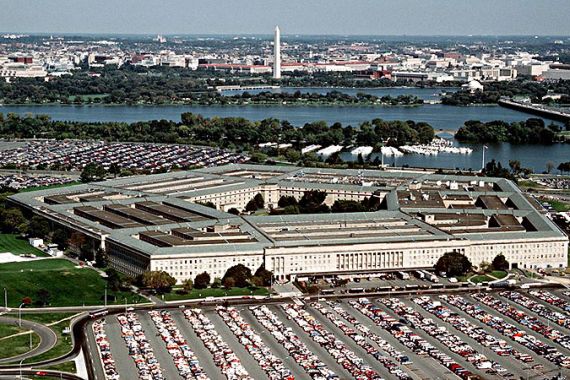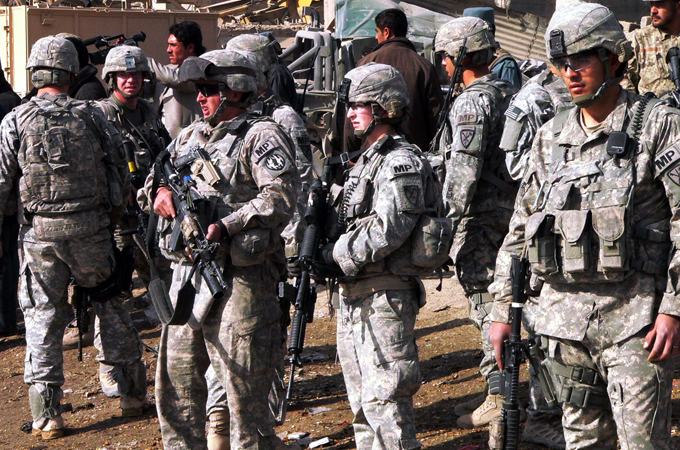Plan to shrink Pentagon budget
Proposal to save $78bn envisages cutting troop levels, abandoning new weapons programmes and restructuring bureaucracy.

 |
| The planned budget cuts are subject to congressional approval and timely troop withdrawal from Afghanistan [EPA] |
The US is planning to cut its defence expenditure by $78bn in a move that includes freezing the Pentagon’s budget by 2015, shrinking army and marine troop levels and abandoning plans for the acquisition of new weapons technology.
The budget cuts are subject to the approval of the US congress, and involve a further $100bn in cost saving measures.
Keep reading
list of 4 itemsDeadly Sahel heatwave caused by ‘human-induced’ climate change: Study
Woman, seeking loan, wheels corpse into Brazilian bank
UK set to ban tobacco sales for a ‘smoke-free’ generation. Will it work?
The plan is aimed at helping the US government trim its spending, and, if passed, would be the first time the the Pentagon’s budget has decreased since 1998. The current proposal calls for the Pentagon to freeze its budget by 2015, allowing for increases due to inflation.
The proposal is contingent on the US military withdrawing from Afghanistan on time [troop withdrawals are due to start in mid-2011], and on congress agreeing to cancel programmes that would potentially eliminate US domestic jobs as well as retired US military families paying more for healthcare.
Robert Gates, the US defence secretary, has acknowledged that projections that are based on proposed military timelines may not be accurate, but stressed that the Pentagon is “not exempt” from belt-tightening because of its charge of defending the country.
He said a major objective of the cuts was to make the US department of defence (DoD) “less cumbersome, less top-heavy and more agile and effective”.
“My hope and expectation is that as a result of these changes over time what had been a culture of endless money, where cost was rarely a consideration, will become a culture of savings and restraint,” Gates said.
He called the proposals modest and realistic.
Admiral Mike Mullen, the chairman of the US joint chiefs of staff, said he thinks the war in Afghanistan will shrink by 2014, when the US plans to hand over security responsibilities to the Afghan government.
Mixed reception
The proposed budget cuts are likely to draw the ire of members of the US congress, with representative Buck McKeon, a Republican member who is also chairman of the House of Representatives Armed Services Committee, already stating that he is “not happy” with the plan.
“This is a dramatic shift for a nation at war, and a dangerous signal from the commander-in-chief,” he said.
Speaking to Al Jazeera, Lieutenant-Colonel Anthony Shaffer, a former intelligence officer with the US army, said that the proposals were “just suggestions, because as much as Secretary Gates has the best interests for the future of the department of defence [at heart], he doesn’t get the final vote”.
He said that the proposals will face tough opposition in congress, where members will have political concerns over some of the measures.
“As much as I believe that these [planned cuts] are logical, logic may mean very little when it comes to dealing with congress on the future of the DoD,” he said.
Shaffer also said that the cuts envisage changing the way in which the US military carries out operations, with a greater focus on smaller, Special Forces operations, which are “a much cheaper option than these land-focused invasion forces”.
Other politicians, including both conservatives aligned with the Tea Party movement and anti-war Democrats from across the aisle, have criticised the defence department for not doing enough to reduce its $0.5tn annual budgets.
Troop reductions
The Gates plan’s reliance on troop reductions in both the army and marines is another proposal that is likely to meet opposition in the congress, whose members have repeatedly called for increasing the number of ground troops to ensure they are not subject to lengthy deployments.
Congress members are also likely to oppose cuts or savings that involve cancelling defence-production projects, which would cause some US workers to lose their jobs.
Gates has said that the proposal falls between the extremes of those who want to shrink the Pentagon’s budget and those who wish to expand it.
The plan calls for $553bn to be spent in 2012 on annual defence programmes such as weapons modernisation and troop pay.
That amount does not include war spending and, while it is $13bn less than the Pentagon had asked for, still represents a three per cent increase after inflation.
The plan calls for the rate of increases in spending to slow, before halting in 2015 and 2016.
To help offset the cuts, Gates said the Pentagon will be reducing the number of soldiers in the army by 27,000, and in the Marines Corps by 20,000. That move would save up to $6bn.
The military bureaucracy will also take a hit, with the US Joint Forces Command headquarters in Norfolk, Virginia, to be shut down. That facility employs approximately 6,000 people and has an annual budget of $1bn.
The White House on Thursday confirmed that Barack Obama, the US president, has accepted the recommendation to shut the command, at a date to be decided by Gates.
Pentagon staffing numbers will also decrease.
Healthcare payments
Another move that is likely to be opposed by members of the US congress will be the introduction of “modest” increases in the healthcare payments of retired military officers and their families.
The $7bn plan to overhaul retired personnel’s healthcare, known as TRICARE, will involve increasing the annual payments from their current levels of $460 per year. Those payment levels have remained unchanged since 1995.
The same healthcare coverage would cost $5,000 for civilian federal workers.
The new plan would increase the level of payments for US military retirees under the age of 65.
Other measures to cut the $78bn will come from freezing civilian pay, cutting the size of the general officers corps and other bureaucratic steps.
An additional $100bn in savings have been found in the military’s five-year budgets. Gates has said that the services will mostly be allowed to reinvest this money in other programmes, mostly for weapons modernisation.
The navy and Marines Corps, for example, has cancelled a $14bn programme to develop the Expeditionary Fighting Vehicle.
Gates said that money will now be used to procure additional ships, F-18 fighter jets and new electronic jammers.